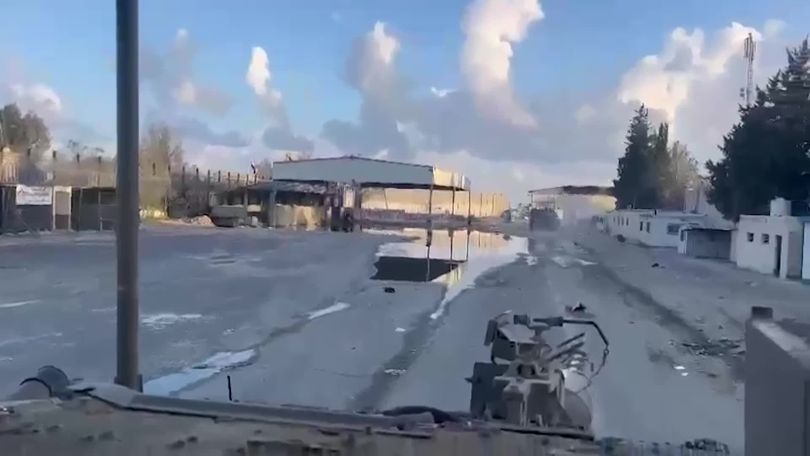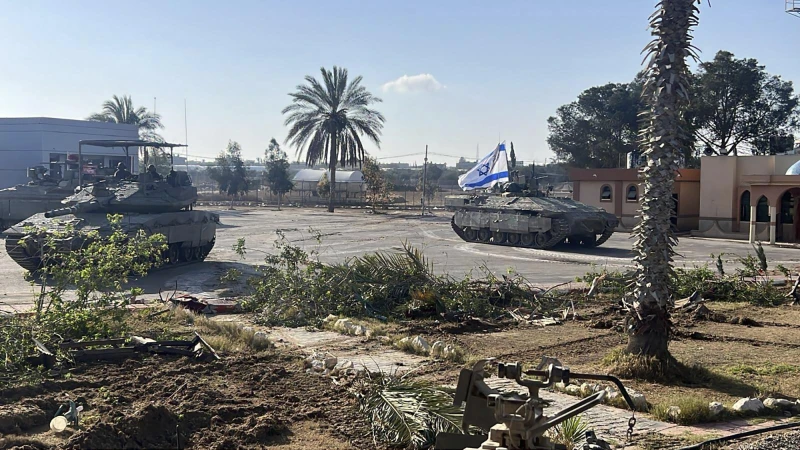In a move described by the White House as a limited operation, Israeli troops took control of the crucial Rafah border crossing in Gaza on Tuesday.
The seizure comes amidst mounting fears of a full-scale invasion of the southern city and ongoing talks between Hamas and Israel over a cease-fire and hostage release.

The closure of the Rafah crossing from Egypt and the Kerem Shalom crossing from Israel has raised concerns at the U.N. about the potential collapse of aid flow to Palestinians.
U.N. officials have reported that northern Gaza is already experiencing “full-blown famine.”

The Israeli operation followed a day of diplomatic whiplash, with Hamas announcing its acceptance of a cease-fire proposal that Israel claimed did not meet its core demands.
Despite the setback, hope remains for a deal that could bring at least a temporary halt to the seven-month-long war, which has claimed the lives of more than 34,700 Palestinians, according to local health officials, and has left the Gaza Strip in ruins.

By seizing the Rafah crossing, Israel now has complete control over the movement of people and goods in and out of Gaza for the first time since its withdrawal in 2005.
Prime Minister Benjamin Netanyahu called the capture an “important step” toward dismantling Hamas’ military and governing capabilities, while Defense Minister Yoav Gallant warned of deepening the Rafah operation if hostage deal talks fail.

Hamas official Osama Hamdan, based in Beirut, stated that the militant group would not succumb to military pressure or threats and would reject any “occupying force” at the Rafah crossing.
White House National Security Council spokesman John Kirby characterized the operation as “limited in scale and duration,” aimed at disrupting Hamas arms smuggling.
He expressed optimism about the ongoing negotiations, stating that Israel and Hamas “should be able to close the remaining gaps” to reach an agreement.
CIA chief William Burns is set to attend further talks in Cairo with representatives from Israel, Egypt, and Qatar, while Hamas has also sent a delegation to meet separately with Arab mediators.

The looming operation has forced the evacuation of the Abu Youssef al-Najjar Hospital, a key medical center treating those wounded in recent airstrikes on Rafah.
The situation threatens to widen the rift between Israel and its main ally, the United States, which has expressed concern over the fate of approximately 1.3 million Palestinians crammed into Rafah, most of whom have fled fighting elsewhere.
President Joe Biden has repeatedly warned Israeli Prime Minister Netanyahu against launching an invasion of the city, but Netanyahu’s far-right coalition partners have threatened to topple his government if he calls off an offensive or makes too many concessions in cease-fire talks.
As Israeli strikes continue to pound Rafah, Palestinian families are fleeing the city’s eastern neighborhoods, uncertain of their next destination.
The seizure of the Rafah crossing has left them feeling trapped and hopeless, with many questioning whether a deal can be reached.
The families of Israeli hostages, including Rotem Cooper, whose 85-year-old father Amiram was among those abducted during Hamas’ Oct. 7 attack, have also expressed despair over the government’s inaction on a deal.

The Israeli military claimed intelligence indicated the Rafah crossing was being used for “terrorist purposes,” though evidence was not immediately provided. Hamas fighters near the crossing were accused of launching mortar attacks that killed four Israeli troops near Kerem Shalom on Sunday and firing more mortars and rockets from the area on Tuesday.
The U.N. humanitarian affairs office was denied access to the Rafah crossing by Israeli authorities, with spokesman Jens Laerke warning of a critically low fuel buffer for aid trucks and generators.
Egypt’s Foreign Ministry condemned the seizure of the Rafah crossing, calling it “a dangerous escalation” and warning that any occupation of Rafah or an attack forcing Palestinians to flee into Egypt would threaten the 1979 peace treaty with Israel.
As the war continues to take its toll on the people of Gaza, the international community watches anxiously, hoping for a breakthrough in cease-fire talks and the release of the estimated 100 hostages and remains of 30 others still held by Hamas.
Credit: AP.com


